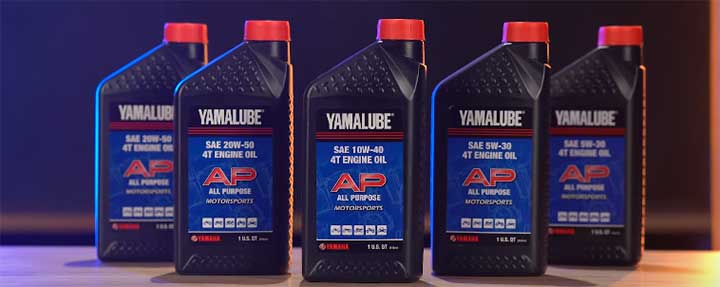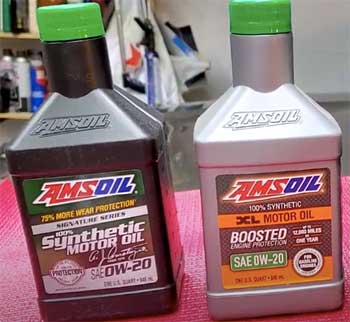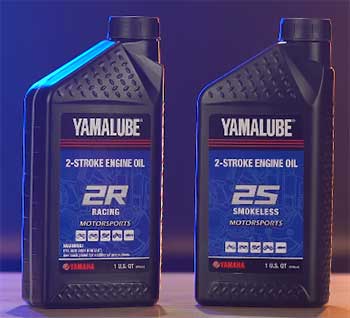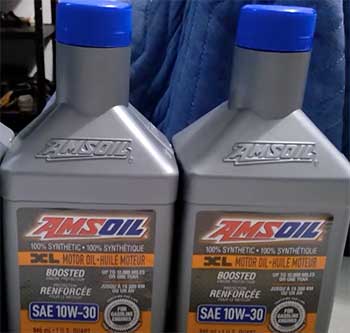When it comes to keeping your motorcycle running smoothly, using the right engine oil is crucial. Two of the most popular brands of motorcycle oil are Yamalube and AMSOIL.
But which one is better for your bike?
In this comprehensive guide, we’ll compare Yamalube and AMSOIL head-to-head, looking at factors like ingredients, real world testing, price, availability, and more. By the end, you’ll have the information you need to choose the best oil for your motorcycle.
A Brief Comparison Table
| Feature | Yamalube | AMSOIL |
| Base Oil Type | Mineral | Full Synthetic |
| Additive Package | Conventional anti-wear additives | Extra zinc, phosphorus and proprietary additives |
| Cold Temperature Performance | Good | Excellent |
| High Temperature Stability | Moderate | Very Good |
| Cost Per Quart | $5 – $10 | $8 – $15 |
| Availability | Widely available at Yamaha dealers | Limited to AMSOIL dealers and website |
| OEM Recommendation | Recommended by Yamaha for Yamaha bikes | Not OEM specified |
| Racing Usage | Used by Yamaha factory teams | Used by many professional teams |
| Ideal Application | Average street riding conditions | High-performance and racing applications |
Overview of Yamalube Motorcycle Oils

Yamalube oils are manufactured by the Yamaha Corporation specifically for use in Yamaha motorcycles. There are several different formulations under the Yamalube brand that are designed for different types of Yamaha bikes, including sportbikes, cruisers, dual sport, and off-road. Some key things to know about Yamalube motorcycle oils:
- Designed specifically for Yamahas: Yamalube oils are engineered to meet the specific needs of Yamaha engines. Yamaha claims they offer optimal protection and performance.
- Mineral-based formulation: Most Yamalube oils use a mineral oil base stock rather than synthetic. They promote good film strength to protect engine internals.
- Range of weights and formulations: Yamalube comes in the major viscosities – 10W-40, 20W-50, etc. There are also formulations for wet clutches and racing applications.
- Affordable price: Yamalube oils are competitively priced, making them an attractive option for budget-minded riders. A quart usually costs around $5 to $10.
- Wide availability: Since it’s a Yamaha product, Yamalube oils are easy to find at Yamaha dealerships and motorcycle shops.
Overview of AMSOIL Motorcycle Oils

AMSOIL entered the powersports market in 1972 and today offers a wide array of motorcycle oils under its Signature Series and Dominant brands.
Here’s an overview:
- Synthetic formulations: AMSOIL motorcycle oils use advanced synthetic base stocks that are engineered for better protection across a wide temperature range.
- Diverse product range: AMSOIL has specific formulas for Harley-Davidson, metric cruisers, sportbikes, dirt and dual sport bikes. There are also oils for wet clutch and racing applications.
- Cold weather performance: With a broad viscosity range from 0W through 20W-50, AMSOIL oils flow well in cold temperatures to prevent start-up wear.
- Added anti-wear additives: AMSOIL adds extra anti-wear agents like zinc and phosphorus to further protect high-performance motorcycle engines against premature damage.
- Higher cost: AMSOIL oils are premium products that cost significantly more than conventional oils. Expect to pay $8 to $15 per quart.
- Limited availability: AMSOIL is only sold through dedicated dealers, distributors and their website. It’s not as easy to find as Yamalube.
Key Differences Between Yamalube And AMSOIL
Now that we’ve provided an overview of each brand, let’s take a deeper look at how Yamalube and AMSOIL stack up against one another in key categories.
- Ingredients and Engineering
When it comes to motorcycle oil, the base stock and additive package are what really matters. Higher quality base stocks and more advanced additives lead to better lubrication properties.
Most Yamalube motorcycle oils use mineral oil base stocks, which provide decent protection but are more primitive than today’s top-tier synthetics. They also tend to form more deposits at high temperatures compared to synthetic bases.
By comparison, AMSOIL motorcycle oils are full synthetic. They are constructed from hydrocracked synthetic base oils that deliver improved thermal stability, film strength and high temperature deposit control.
AMSOIL also fortifies its oils with a higher level of anti-wear additives. Yamalube contains basic anti-wear agents, while AMSOIL adds extra protection in the form of zinc, phosphorus and other proprietary additives. The additional anti-wear agents in AMSOIL oils give them a leg up in protecting high-performance motorcycle engines.
Advantage: AMSOIL
AMSOIL motorcycle oils are more advanced both in base stock technology and additive chemistry compared to the conventional mineral-based Yamalube formulations. The synthetic base and extra anti-wear additives give AMSOIL an edge in terms of potential engine protection.
- Real World Testing

Laboratory oil testing provides insights into an oil’s technical properties.
However, real world testing shows how an oil performs where it matters most – inside a running engine.
Both Yamalube and AMSOIL conduct extensive street bike and racing bike testing to prove their products.
Yamalube oils are raced by the Yamaha factory teams in MotoGP, Superbike and off-road competition.
AMSOIL powers many top professional racing teams as well. Extensive miles have been put on both oils without engine failures.
Independent testing also demonstrates the strength of AMSOIL motorcycle oils. In one study by an ASTM lab, AMSOIL ran a grueling 124-hour horizontal dyno test in a Harley-Davidson V-Twin engine with no oil changes.
It showed only 2% viscosity loss after the test – far exceeding the ASTM standard for shear stability of a 30% loss maximum. Yamalube has not provided this kind of 3rd party testing data to demonstrate its robustness.
Advantage: AMSOIL
Both Yamalube and AMSOIL have logged many race-pace miles at the highest levels of motorcycle competition.
However, AMSOIL has provided more evidence of its oil’s stamina in the form of 3rd party engine dyno testing results. This helps substantiate AMSOIL’s claims of superior performance and durability.
- Pricing and Availability

Just as important as performance is an oil’s affordability and availability. Yamalube shines in these areas.
It is competitively priced at around $5 to $10 per quart, notably cheaper than full synthetic AMSOIL.
Yamalube oils are also stocked at Yamaha dealerships nationwide, so they are very convenient to purchase.
In contrast, AMSOIL motorcycle oils command a premium price ranging from $8 to $15 per quart.
The cost reflects the higher grade synthetic base stocks and additives used in their manufacture.
AMSOIL availability is also limited compared to Yamalube – it is primarily sold through authorized AMSOIL dealers and their website.
For riders watching their budget who value convenience, Yamalube has a pricing and availability advantage. AMSOIL is a more specialized product that carries a premium cost. It can be harder to obtain as well. This may be a turn-off for some motorcyclists, even though AMSOIL offers superior performance.
Advantage: Yamalube
The affordable price point and widespread availability of Yamalube motorcycle oils makes them the more convenient, budget-friendly option in most cases. AMSOIL is priced at a premium level and somewhat restricted in its availability.
Also Read: Comparison of AMSOIL Boosted And Signature Motor Oils.
Frequently Asked Questions (FAQ)
Based on the technical merits, AMSOIL motorcycle oils are a higher grade product compared to conventional mineral-based oils like Yamalube. The synthetic base stocks provide improved stability and deposit resistance. AMSOIL also incorporates extra anti-wear additives absent in many mineral oils. So for outright performance and protection, AMSOIL has an edge. However, that doesn’t make AMSOIL the automatic best choice for every user. Factors like price and availability still play a role in the decision.
Mobil 1 and AMSOIL are both leading synthetic motorcycle oil brands. Their top-tier oils are comparable in performance. Both use high quality synthetic base stocks and robust additive packages. Either would be an excellent choice for a high performance motorcycle application. Mobil 1 excels in keeping viscosity stable at extreme temperatures, while AMSOIL adds more anti-wear additives. For most riders, either brand would serve their bike well. It comes down to personal preference.
Yamalube oils are produced by the Yamaha Corporation exclusively for use in Yamaha motorcycles. Yamaha engineers and formulates Yamalube oils to meet the specific requirements and protection needs of Yamaha engines. The oil is then blended and packaged by Yamaha’s production partners. So while not blended in-house, Yamalube has full oversight of the formulations.
For gasoline-powered boat engines, including outboards and sterndrives, a marine-grade mineral or synthetic oil is ideal. Good choices include Yamalube 4M for Yamaha motors or AMSOIL Saber Outboard Oil for other brands. Look for an oil that offers corrosion protection, detergency for fuel dilution, and stable viscosity in hot-running conditions. A specific marine oil like these will optimize performance and longevity in boat engines.
Final Verdict: Which Is Better For Your Bike?
When weighing all the factors, AMSOIL is the technically superior motorcycle oil compared to Yamalube conventional oils. AMSOIL offers robust synthetics, a potent anti-wear formula, and proven robustness on the dyno.
For someone wanting ultimate engine protection and performance, AMSOIL is worth the extra cost. It is ideal for high-performance street and racing applications.
However, for everyday street riding and average conditions, Yamalube oils are still a great choice. Their mineral-based formula provides satisfactory protection at a reasonable price. And Yamalube oils are engineered specifically for the unique requirements of Yamaha engines.
For the typical Yamaha owner doing casual street miles, Yamalube oils offer the best blend of affordability, availability and OEM pedigree.
There are valid cases to be made for choosing either brand. Assess your priorities in terms of budget, riding conditions, performance needs and convenience to decide which oil is the best match for your motorcycle.
Both Yamalube and AMSOIL produce high-quality lubricants that will serve most motorcyclists well.

